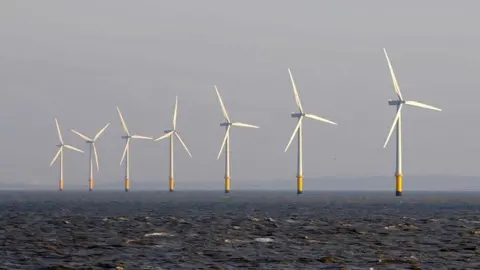Nine major projects for Norfolk
 Martin Barber/BBC
Martin Barber/BBCMajor projects which could change the Norfolk are being planned, although some have stalled and their future is uncertain. Here are nine of the biggest developments in the pipeline this year, as outlined by the Local Democracy Reporting Service.

Driving across the sea
 Centre Port
Centre PortA bid to build a tidal barrage stretching from Norfolk to Lincolnshire was unveiled at the end of last year.
While the scheme has seen objections from conservation groups, proponents say it would help protect The Fens from flooding, generate tidal power and would allow a new deep-sea container port to be built.
A planning application has yet to be submitted, but Centre Port, the group behind the proposal, said it could be operational by the end of the decade if approved.
Centre Port is trying to raise £5m for a feasibility study.

A new 'railway village'
 Adrian S Pye/Geograph
Adrian S Pye/GeographPlans to build a new 5,000-home town north of Dereham could take a significant step forward in 2023.
The proposals have been dubbed a "railway village" and would lie close to the heritage Mid-Norfolk Railway at North Elmham.
The 1,278-acre site has been put forward by its owners as a potential area for development included in Breckland Council's forthcoming local plan - a document detailing how the district should grow over the next two decades.
The submission is not a formal planning application.
If planning was ever approved, the resulting settlement would be likely to be larger than existing towns like Watton (population 8,417) or North Norfolk towns such as Fakenham (8,285) and Cromer (7,949).
Breckland's eight-week consultation on the local plan is taking place in the first few months of this year.

Conserving water supplies
 Anglian Water
Anglian WaterAnother major project in the pipeline is a new reservoir on the Norfolk and Cambridgeshire border.
It would be capable of supplying around 100 million litres of water per day throughout the year.
It will work by storing excess water in the winter for use in dry summers and mean less extraction from sensitive sources like chalk streams.
The proposed site is between Chatteris and March in Cambridgeshire, but it would help supply homes in Norfolk.
The feedback from an initial consultation is due to be published in the spring.

An end to slow journeys?

The Long Stratton Bypass in South Norfolk has been mooted for decades and finally looked like it was going to get under way after funding was approved in 2021.
The £46.2m scheme will mean motorists will see an alternative to the long drive along the A140 through the centre of the South Norfolk town.
However, the project is linked to the construction of 1,800 new homes in the area, held up due to the issues surrounding nutrient neutrality.
The measure is meant to ensure that excess nutrients, from animal and human waste, do not flow into waterways around the Broads and the River Wensum.
This policy has stopped homes from being built in large parts of Norfolk until mitigation measures have been agreed.
Now those measures are finally moving forward, the scheme can move ahead.

Linking the bypass

A flagship infrastructure project has been thrown into doubt after Norfolk County Council announced an indefinite delay earlier this month.
The 3.9-mile (6.27km) Western Link road is designed to connect the A47 west of Norwich with the Northern Distributor Road and has been hailed as a council priority for several years.
But County Hall's cabinet paused plans to lodge a planning application for the road amid mounting concerns over the government's willingness to bankroll the project.
A business case was submitted two years ago and, so far, the government has not indicated it will approve funding.
The council has not said when the decision would be made, but insisted it remained committed to the project.
Three road improvement schemes on the A47 are also due to get moving this year, but a High Court challenge could hamper progress.
The plans involve the revamp of Thickthorn roundabout on the edge of Norwich and the dualling of stretches of road between Blofield and North Burlingham, plus Easton to North Tuddenham.
The court has agreed to consider claims by climate campaigners that the impact of carbon emissions that would result from the schemes had not been properly addressed.

Offshore wind

A series of major windfarm schemes are planned for the Norfolk coast, including Swedish energy giant Vattenfall's Boreas and Vanguard projects, which could be some of the largest in the world.
The company was granted development consent for Vanguard in 2022, pledging to get it under way early this year.
The two schemes could power more than 3.9 million homes in the UK.
Hornsea Three, another major scheme which could power 3.2 million homes, is due to start being built this month.

An improved rail junction

Improvements at a key rail junction, which could help to boost growth across the region, could steam ahead this year.
Ely Junction, at the Cambridgeshire city, is important because it links five lines connecting Norwich, Ipswich, Cambridge, Peterborough and King's Lynn.
It is currently operating at full capacity, which limits the opportunity for growth of routes cross-country freight services, and for more frequent passenger services between West Norfolk and London.
An outline business case was submitted to the Department for Transport last year to seek money for the next stage of the design process - but the government has yet to make a decision.

Hospital rebuilds
 Shaun Whitmore/BBC
Shaun Whitmore/BBCTime is running out for the Queen Elizabeth Hospital (QEH), in King's Lynn, which experts say will be unsafe to use by 2030.
The QEH, whose roof is held up by more than 3,000 props, is still waiting to hear whether it will be get approval for a rebuild on what is currently its car park.
The roof of the 500-bed hospital was built in the late 1970s with an expected working life of 30 years.
NHS sources and politicians have suggested a decision on whether the government would pay for a rebuild was expected soon this year.
 Shaun Whitmore/BBC
Shaun Whitmore/BBCJames Paget Hospital in Gorleston was one of 40 new hospitals the government approved in 2020.
A is currently being built at the north end of the hospital's grounds, providing a blueprint for how inpatients could receive care when the rebuild is complete.
The new ward is due to be operational in May.

First elected leader
Norfolk's proposed devolution deal would introduce a directly elected leader, effectively a mayor for the whole of Norfolk, in all but name.
The policy would bring major changes to the way the county council was run, with Norfolk receiving £600m of funding over the next 30 years, while powers would be transferred from Whitehall to the new leader.
A six-week public consultation is being carried out and, if a deal is agreed, people would get their first chance to vote directly for the council leader in May 2024.
The leader of the council is currently chosen by their fellow councillors.

Find BBC News: East of England on Facebook, Instagram and Twitter. If you have a story suggestion email [email protected]
